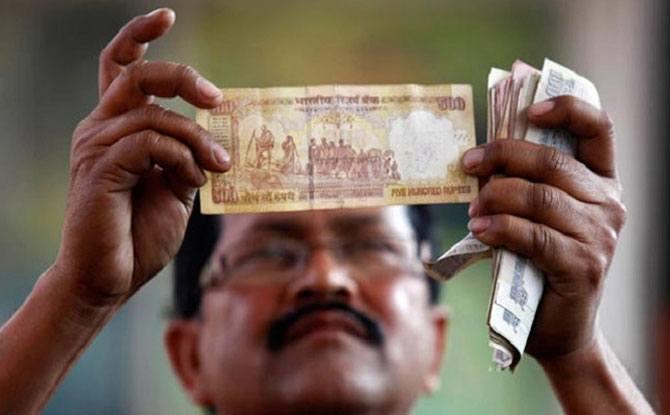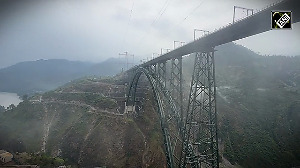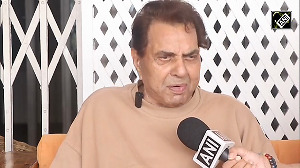The Lok Sabha on Tuesday passed a bill which makes holding of more than 10 old notes of Rs 500/1000 denomination punishable with a minimum fine of Rs 10,000, with the government saying the aim was to check parallel economy using the scrapped notes.

Piloting the Specified Bank Notes (Cessation of Liabilities) Bill, Finance Minister Arun Jaitley said it will extinguish the government's liability towards scrapped notes and also eliminate the possibility of their bring used as parallel currency.
"No economy survives with ceased currency that operates in the market. There will be anarchy in the country if non-legal currency operated paralelly in the market," Jaitley said while replying to the discussion on the Bill which was approved by the House after rejecting the amendments moved by Opposition members.
The bill, to replace the ordinance promulgated on December 30, also provides for a minimum fine Rs 50,000 for false declaration by persons who were abroad during the demonetisation period (November 9-December 30, 2016) and given time to deposit the scrapped notes with RBI till March 31.
Jaitley said the volume of currency in India was extra ordinarily large and this has led to a shadow and parallel economy, facilitating crime and acting as a facilitator for corruption, fake currency, and terrorism.
"We must move to a greater digitial economy and therefore free the economy from these vices....you cannot allow a parallel currency to operate in the market. So holding the currency beyond a specificed limit for research and numismatic purposes will be an offence. This is the rationale behind this bill," he said.
He added that the volume of cash which is 12.2 per cent of the GDP is very high as compared to other countries.
Responding to various questions raised by the members, Jaitley said discussions on demonetisation started with the RBI in February 2016 and later there used to be weekly meetings to oversee the preparations.
The design for new notes was approved by the RBI and the government in May 2016, he said, adding utmost secrecy was maintained keeping in view the nature of the exercise.
Terming demonetisation as "morally and ethically" correct decision, Jaitley asked the Opposition not to defend the black money in the name of farmers as they are exempted from taxes and they cannot have untaxed wealth.
"This (demonetisation) decision needed a lot of courage and broad shoulders," he said, wondering why such a decision was not taken in the last 70 years.
He also dared the Congress, which has been vigorously attacking the government's demonetisation decision, to list out any single step which its government took to curb the black money in ten years of its rule between 2004 and 2014).
Instead, the NDA government, he said, undertook a series of measures, including constitution of the SIT, negotiations of tax treaties with Mauritius, Cyprus and Singapore, besides bringing in tough legislations to deal with black money within the country and outside.
Rejecting the contention that the government cannot limit withdrawal of currency from bank accounts, Jaitley said RBI under the Banking regulation Act has power to do so in public interest.
He further said the demonetisation has not impacted air travel, sowing of Rabi crops and the performance of the manufacturing sector.
"Excise and VAT collections have gone up with the exception of West Bengal and Delhi.
He, however, admitted that there will be impact on some sectors in the short run, but the country will benefit in the long run with the economy becoming cleaner and bigger.
"It is true that some sectors could be impacted. For instance, the perishable and luxury goods and on account of deferred purchases.
"But in long term, it will have a beneficial impact as more will come into the formal economy and banks will also increase the capacity of banks to lend more," Jaitley said, adding the money which was anonymous will now be known and the owner will be taxed and tracked.
The finance minister said those declaring the black money under the Pradhan Mantri Garib Kalyan Yojana ny March 31 will have to pay tax of 60 to 65 per cent tax and if they are caught the penalty will be 80-85 per cent.
"By merely depositing money in the bank it will not become white. The IT department has found 18 lakh people whose income did not match with the deposits it made with their bank accounts post demonetisation.
Participating in the debate, N K Premachandran of RSP said former Prime Minister Manmohan Singh was wrong in saying the demonetisation step was a "legalised plunder" because it was a "illegalised plunder".
Congress MP Shashi Tharoor also attacked the government, saying demonetisation has severely affected almost all sectors of Indian economy besides dealing a blow to overall growth and rendering lakhs of people jobless.
He said around 50,000 engineers had to be hired to recalibrate the ATMs for new notes.
Tharoor also called "illegal" government "disallowing" citizens to withdraw their own money from banks, adding Prime Minister Narendra Modi's call seeking 50 days to implement demonetisation was another "jhumla".
In his hard hitting attack on the government, Tharoor said almost all sectors of the economy, be it small and medium enterprises, real estate, agriculture, tourism and manufacturing were grounded by demonetisation.
He said as estimated earlier, the RBI's liability will not come down due to demonetisation as 95-97 per cent of the notes have come back to the banking system, adding the primary objective of cleansing the blackmoney was defeated.
Referring to some bank officials allegedly involved in alleged corrupt practices in exchange of old notes, he told Jaitley, "In your drive against corruption, you have created new forms of corruption."
He said there was no new security features in new currency notes and that the government has failed to address the problem of counterfeit currency.
Tharoor also quoted the economic survey to argue that demonetisation has hit the economy very hard and wondered why the government did not mention about the measure while listing achievements in the document.
Chapter 3 of Economic Survey clearly says how demonetisation affected the economic growth and even referred to former Prime Minister Manmohan Singh's observation that it will bring down the GDP by 1-2 per cent.
Giving out a range of statistics about the economy, Tharoor said Modi's surgical strike on blackmoney has resulted a huge collateral damage on the economy.
TMC's Saugata Roy also raised legal validity of the notification on demonetisation and even said perhaps Jaitley knew about the move only on the afternoon of November 8, hours before the PM made the announcement.
"The FM is holding somebody else's baby," Roy said.
Referring to interaction with RBI governor Urjit Patel at the Parliament Standing Committee on Financerecently, Roy said Patel could not answer how much money out of Rs 15.44 lakh crore demonetised currency was back in the banking system.
Congress MP Gaurav Gogoi said the poor were made "sacrificial lamb" and the government did an "appendicitis" surgery for a heart problem.
Saugata Roy (AITC) said that by taking away the cash from the society, the government has broken backbone of the society.
Stating that the government was responsible for the death of 150 people, he said that "We don't blame Jaitley jee (finance minister) but the blame should go to the man who announced the decision."
Stating the demonetisation as "cruel and reckless step", he said that move was to help the electoral process and labelled it as the worst decision since independence.
"The people of India will reply against the cruel step," he said.
Referring to demonetisation as a "capital punishment", A Sampath (CPI-M) said if the bill contained penal provision, it should have been discussed in the Standing Committee.
"If the power of the Standing Committee has been snatched by the executive, it is a pity," he said.
He also alleged that through the demonetisation the government intends to help the e-wallet companies.
He termed demonetisation as a war against the people.
Supriya Sule (NCP) said that she wanted to know how much money has come back to the banks post demonetisation.
She also questioned whether the demonetisation has really served the purpose in terms of removing corruption.
She urged the finance minister to give fair treatment to the district cooperative banks.





